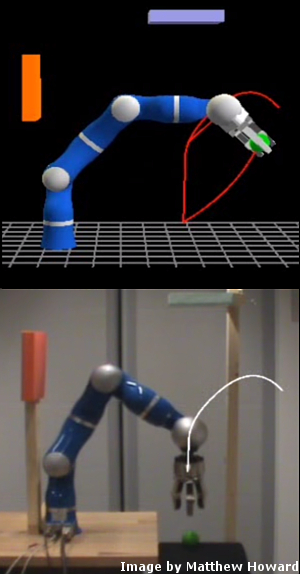#AskRobotics – the future of robots and us
Posted on 13 June 2014
#AskRobotics – the future of robots and us
 By Dr Matthew Howard, Lecturer in Informatics at King’s College, London
By Dr Matthew Howard, Lecturer in Informatics at King’s College, London
Will the rise of machines threaten the human race? Are they truly capable of emotional intelligence? Will they put us all out of work? And more importantly, can they do the washing up?
Much of the public perception about robots is driven by Hollywood movies and alarmist or poorly informed media claims. People fear robots because they are portrayed with super-human capabilities, or because they worry about losing their jobs. Yet real robots are not like that. Robots are far less capable than humans or indeed many animals or insects, except when it comes to highly specialised tasks, and even then, there is always a human holding a big red emergency stop button.
That is not to say, however, that robotics research is not delivering exciting new science, engineering innovations, or raising fascinating ethical issues. It is a hugely multidisciplinary field filled with creative people who push the boundaries of computer science and engineering. As a result of this, and by simply knocking together a few electrical and mechanical components, we find ourselves raising all sorts of important questions and issues.
For example, what can a simple mechanism, employing springs and electromotors, tell us about the best way to throw a ball? Should you throw it over arm or under arm? How can a robot learn skills that make them useful to humans? Would a robot with ‘natural’ movements be more readily accepted by humans? What are the underlying principles that make us move the way we do when evolution could have chosen from an infinite variety of movements that would have been equally sufficient?
What can a dead fish tell us about how to design robots that can walk? What does it tell us about neuroscience and locomotion? Wackier still, have you ever seen a robot stand-up comedian? Did you ever think such a thing could exist? Or how about a robot playing the flute? Have you ever seen a mechanical turkey, pulling a cart, or doing a back-flip?
A full answer to any of these might not be found in 140 characters or less, but at least we can maybe give a few pointers to where you can find out more!
Event information
In #AskRobotics, Dr. Matthew Howard, Lecturer in Robotics at the Department of Informatics King's College London's, will use Twitter to answer questions from the public on the current and future state of robotics research.
Within the Centre, Matthew leads the robotics and machine learning group, having previously held positions at the University of Tokyo and Edinburgh University, and has worked in partnership with Honda Research and various universities across Europe.
Matthew’s research examines how robots can learn behaviours by interacting with humans. This can be through having a robot watch a human doing something and then try to copy it. It can be through giving the robot rewards when it does something right (or punishments when it messes up), or it can be through making recordings of physiological factors, such as muscle signals, to examine the motivations and intentions of human behaviour. Matthew is also fascinated by the way simple, physical effects can create surprising capabilities both in animals and robots, and investigates the use of these in designing new robotic devices.
